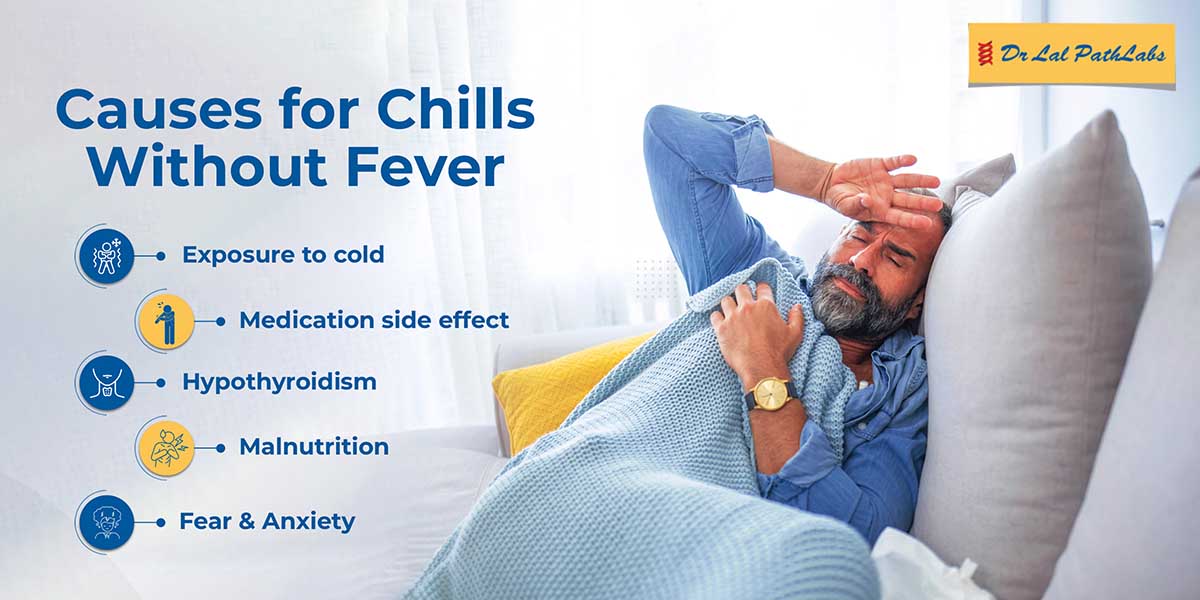9 Causes For Chills Without Fever
Introduction
Chills and fever often go hand in hand, as the body’s natural response to infection or illness typically includes an elevated temperature. However, experiencing chills without a fever can be puzzling and concerning. The sudden sensation of shivering and feeling cold, even in a warm environment, can leave individuals seeking answers. This blog will explore the reasons behind chills without fever and shed light on possible underlying causes.

9 Potential Causes of Chills Without Fever
-
Cold Environment
Exposure to a cold environment is the most apparent reason for experiencing chills without fever. Our bodies have an innate mechanism to protect us from external temperature changes. When faced with cold temperatures, the body responds by generating involuntary muscle contractions, shivering to maintain internal warmth. The feeling of cold intensifies as the blood vessels constrict to preserve core body heat.
Remedial Solution: Dressing warmly in layers, using blankets, and avoiding prolonged exposure to cold can alleviate this type of chills.
-
Anxiety and Stress
Emotional responses like anxiety, stress, or fear can trigger chills, even without a fever. During stressful situations, the body releases stress hormones, such as adrenaline, which causes blood vessels to constrict. This diversion of blood away from the skin’s surface can lead to a sudden sensation of chilliness.
Remedial Solution: Practicing relaxation techniques like deep breathing, meditation, or yoga can help manage stress-induced chills.
-
Infections
Certain infections, especially viral illnesses like the common cold or flu, can manifest with chills even before a fever develops. When pathogens invade the body, the immune system releases inflammatory chemicals, triggering chills as part of the initial defence mechanism.
Remedial Solution: Adequate rest, hydration, and over-the-counter medications can help manage symptoms and reduce the frequency of chills during infections.
-
Hypoglycemia
Low blood sugar levels, known as hypoglycemia, can induce chills, particularly in individuals with diabetes or those skipping meals. The body’s response to low glucose levels may cause shivering and a feeling of coldness.
Remedial Solution: Monitoring blood sugar levels regularly, maintaining a balanced diet, and eating meals at regular intervals can help prevent hypoglycemic-induced chills.
-
Anemia
Anemia, characterized by a low red blood cell count or haemoglobin deficiency, can lead to chills. As the body struggles to carry oxygen efficiently, it may result in a drop in body temperature and persistent feelings of coldness.
Remedial Solution: Consultation with a medical professional is essential for diagnosing anemia accurately. Treatment options may include iron supplements or dietary changes to address the underlying cause.
-
Medications
Certain medications, such as antibiotics or antiviral drugs, can have side effects that cause chills or sensitivity to cold without elevating body temperature.
Remedial Solution: If chills are a known side effect of medication, discussing alternative options with a healthcare provider is advisable. However, altering or stopping medication without medical guidance can be dangerous.
-
Menopause
Menopausal women may experience chills and hot flashes due to hormonal fluctuations. Estrogen levels play a crucial role in regulating body temperature, and as they fluctuate during menopause, individuals may experience sudden bouts of chills.
Remedial Solution: Lifestyle changes can help alleviate menopausal symptoms, including chills and hot flashes.
-
Thyroid Disorders
An underactive thyroid (hypothyroidism) can disrupt the body’s temperature regulation, leading to chills even in normal environmental conditions.
Remedial Solution: A comprehensive thyroid function test can accurately diagnose thyroid disorders. Treatment may involve thyroid hormone replacement therapy under medical supervision.
-
Substance Withdrawal
Withdrawal from substances like alcohol or drugs can trigger chills as the body adjusts to the absence of the substance.
Remedial Solution: Seeking professional support and medical guidance is essential to manage withdrawal symptoms and address the underlying addiction safely.
Conclusion
Experiencing chills without fever can be an enigmatic phenomenon, but understanding the potential causes is vital for finding appropriate solutions. While some reasons for chills without fever may be relatively harmless, others may require medical attention and treatment. If you or someone you know experiences persistent or concerning chills without fever, seeking the advice of a qualified healthcare professional is crucial for an accurate diagnosis and personalised remedial measures.
Remember, this blog provides information and insights into potential causes but should not replace professional medical advice. Stay informed, care for your health, and proactively seek assistance.













